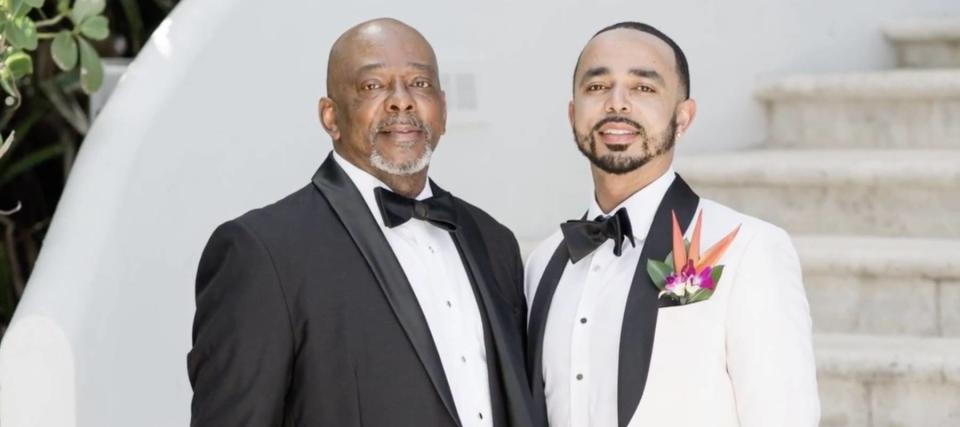Virginia dad gives son $1M winning lottery ticket as wedding gift — how to manage a major financial windfall

Most newlyweds expect stand mixers, silverware, or new sheets as traditional wedding gifts. But for bride-and-groom Kiana and Aaron Andrews of Prince William County, Virginia, they received something a lot more valuable.
Just before their April wedding, Aaron's father, a frequent lottery player, purchased a ticket for the Virginia Lottery's Cash4Life draw — and won. He had the choice of either $1,000 every week for the rest of his life, or a $1 million lump sum payout.
Don't miss
Commercial real estate has beaten the stock market for 25 years — but only the super rich could buy in. Here's how even ordinary investors can become the landlord of Walmart, Whole Foods or Kroger
Car insurance premiums in America are through the roof — and only getting worse. But 5 minutes could have you paying as little as $29/month
These 5 magic money moves will boost you up America's net worth ladder in 2024 — and you can complete each step within minutes. Here's how
But rather than cashing out the ticket, Aaron’s father decided to give the winning ticket to his son as a wedding gift. His dad jokingly told Fox 5, "This was the best way to get him out of my basement."
Prior to receiving the ticket, Aaron and Kiana had decided to move in with Aaron’s father to help them save money. But now, with the help of a financial adviser, they've decided to take the lump-sum payment of $1 million, which allows them to help out Aaron's grandmother, set up college funds for their future children, and, one day, buy a home.
"I have a great father who has done nothing but look out for me!" Aaron told Virginia Lottery officials as he redeemed the ticket.
Lump sum vs. weekly annuity payments
After speaking with a financial adviser, Aaron and Kiana decided to accept the $1 million lump sum cash payout rather than receive $1,000 every week for the rest of their lives. There are several benefits of taking the lump sum.
The $1,000-a-week payment only lasts as long as Aaron is alive. If he happens to die at a young age, for example, the payouts would cease and couldn’t be passed on to his heirs. However, taking the cash payout means he has access to the funds now.
It’s also worth considering that, while $1,000 a week sounds like a lot, the value of that money will change over time due to inflation.
Additionally, if he took the $1,000-a-week payment, Aaron would need to live approximately another 19.23 years to receive $1 million dollars — and he'd miss out on compound interest in the meantime.
Of course, there are tax implications for the lump sum option. Taking the $1 million payout will push Aaron into a higher tax bracket, but it also allows him to access and invest the funds now. Let's look at what would happen if Aaron invested that money.
The average annual return of the S&P 500 is roughly 10% over 20 years. If Aaron invested his $1 million payout and earned an average rate of return, that $1 million would be worth $5.7 million in the 20 years it would take the $1,000 payments to reach $1 million.
That being said, Aaron won’t have the full $1 million to invest due to taxes. But even if he pays, let’s say, half of the lottery winnings to the taxman, he would still have $2.8 million after 20 years at an average rate of return.
By taking the lump sum, Aaron can invest the money, which may also protect it from inflation.
For example, purchasing a certificate of deposit (CD) or putting it in a high-yield savings account will earn an average 4% or slightly more, depending on which financial institution he chooses.
Read more: Car insurance rates have spiked in the US to a stunning $2,150/year — but you can be smarter than that. Here's how you can save yourself as much as $820 annually in minutes (it's 100% free)
How to manage a financial windfall
A large influx of cash, whether it's from an inheritance, lottery winnings, or some other source, can be an exciting and stressful situation. Planning your next steps carefully will ensure you build long-term financial wealth.
First, don't make any large purchases right away. Give yourself time to get used to the idea of having an influx of money, and then speak to a trusted financial adviser. They can review your personal situation and offer guidance. They'll also consider your current debts (if any) and help you set realistic financial goals.
If you can help it, avoid telling family and friends about the windfall. Many people who experience a cash windfall discover that friends and family are more than happy to help them spend it.
Finally, consider setting up a trust fund. This can help protect your assets from legal challenges and make it easier to disburse them upon your death.
Trusts can also have set dispersal rules; for example, they may only allow you to withdraw a set amount each year. This means you won't be tempted to overspend and can make the most of your funds — and your long-term financial goals.
What to read next
Unlock access to 4,700+ hand-picked, single-family homes across America — and the juicy rental cash they can generate. Here's how to start with as little as $10
82% of Americans are missing out on a savings account that pays over 10 times the national average
Stop crushing your retirement dreams with wealth-killing costs and headaches — here are 10 'must-haves' when choosing a trading platform (and 1 option that has them all)
This article provides information only and should not be construed as advice. It is provided without warranty of any kind.

 Yahoo Finance
Yahoo Finance 